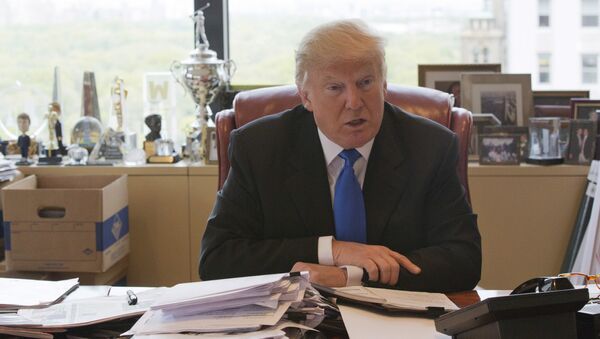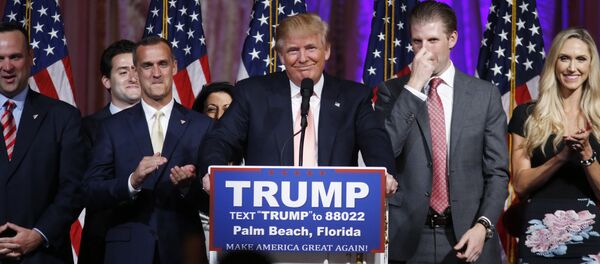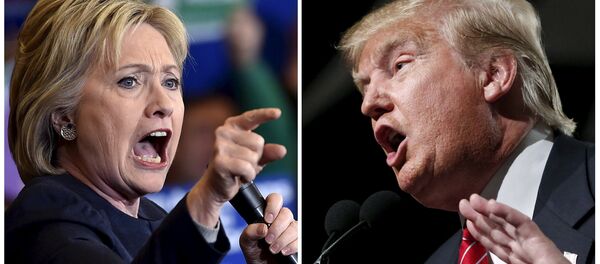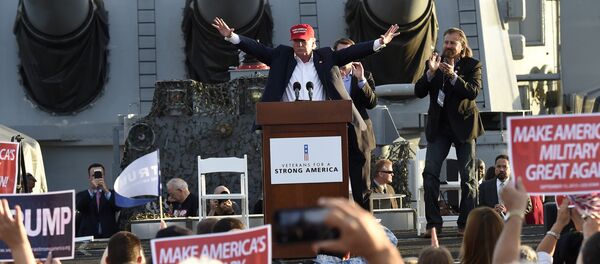Mikhail Khazin is no stranger to making bold predictions. The economist is known among expert circles in Russia for predicting the 2008 global economic crisis long before it began.
In a recent appearance on the Moscow-based Russian radio station Echo Moskvy, Khazin expanded on a theory he developed earlier this year. The theory posits that in a hypothetical matchup between Democratic frontrunner Hillary Clinton and Republican Donald Trump, Clinton serves the interests of the 'globalist financiers', while Trump serves those of the nationalists, or as Khazin refers to them, the 'hard isolationists'.
The economist recalls that with much of the world (Russia included) indentured to US-controlled globalist financial institutions including the US Treasury, the Federal Reserve, the International Monetary Fund, and others, a Trump victory in November would result in massive pressure from local elites connected to the globalist financiers on independence-seeking national governments looking to take advantage of the changes in Washington.
In Russia's case, Khazin notes, it is almost a certainty that Trump would look abandon the US economic dictate which has its roots in the 1990s during the Clinton era, and consists of liberal Russian economists, officials, and financiers with ties to US officials such as former Clinton Treasury Secretary Larry Summers being instructed on how to run the country's economy.
"[If] the election is won by the 'isolationists', they would put pressure on Putin to get rid of the representatives of the opposing wing," including liberal officials, economists and oligarchs, from policy-making circles, the economist explains.
These problems, Khazin suggests, stem from the fact that Trump and Putin are almost certain to come to an agreement. "And this cannot but worry the financiers. For this reason, I predict a sharp increase in pressure on Putin (coming from [the global] financiers and their Russia-based agents), aimed not so much at removing him from office (because it's unclear how such a thing could be done) but to make him a political outcast in the West. How this will be done I can't say, but an attempt will almost certainly be made to 'solve this problem' before November."
Trump's interest in Russia is twofold, the economist explains. "It has a passive component: Russia should not support his enemies among the financiers, and take responsibility for a number of regional issues which Trump does not want to spend American resources on – this includes regional security in Eastern Europe and part of the Middle East, where 'security' consists partly of working to limit the activity of terrorist groups, such as Daesh, which were created by the financiers in the first place."
"It's for this reason," the economist adds, "that the current pro-American (or more accurately, financier-appointed) elites in Eastern Europe," with a few exceptions, "are howling about a mythical 'Russian threat')."
The problem for the financiers and their allies, the economist suggests, is that Trump is likely to operate not only on this passive position, but via a 'proactive scenario' as well. "The issue is that a revanche by the financiers," via elections or by some other means, "remains possible only if the general model (built on the basis of the dominance of the financial sector) remains unchanged."
Russia, Khazin suggests, is one of the few remaining countries in the world which has an economic school and macroeconomic models which can serve to benefit anti-globalist politicians "who have seriously committed themselves to pushing the 'financiers' off the global Olympus." This, he adds, "is a serious trump card, because no other base for a transition from a passive fight against the financiers…exists."
In the final analysis, the economist writes, "the elimination of the 'liberal economic dictatorship' that will become possible for our political elite in the event of Trump's rise will help not only to dramatically reduce the risks to our country's [economic position], but will also allow us to get a serious trump card for negotiations on a more or less equal basis with our foreign partners."




